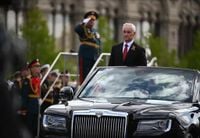On May 9, 2025, Russian Defense Minister Andrei Belousov made headlines as he accepted the 80th Victory Day parade on Red Square in Moscow, dressed in civilian attire. This choice sparked significant public interest and discussion, as the traditional expectation for the Minister of Defense is to don military uniform, reflecting their status as an active military leader.
Belousov, who was appointed to his position less than a year ago, is a civilian without any military rank. This unique circumstance led him to appear at the parade in a sharp black suit paired with a red tie, while proudly displaying a St. George ribbon on his chest, a symbol of military valor in Russia.
The decision to wear civilian clothing at such a significant military event is notable, especially considering the historical context of the Victory Day parade, which commemorates the defeat of Nazi Germany in 1945. Traditionally, this event is marked by a display of military power and the presence of high-ranking military officials in uniform.
As the parade commenced, many viewers tuned in to see how Belousov would present himself. The First Channel broadcasted the parade live, allowing audiences across Russia to witness this momentous occasion. The choice of attire, while protocol-compliant given his civilian status, raised questions about the evolving nature of military leadership in contemporary Russia.
Belousov’s appearance in civilian clothes can be interpreted in various ways. Some may see it as a reflection of a modern approach to military leadership, emphasizing the role of civilians in defense matters. Others might view it as an unusual departure from tradition, potentially signaling a shift in the military's relationship with civilian authority.
Despite the unconventional attire, Belousov's presence at the parade underscores the importance of the event itself. Victory Day is a deeply ingrained part of Russian national identity, celebrated with pride and fervor. The parade not only honors those who fought in World War II but also serves as a platform to showcase Russia's military capabilities.
Belousov's appointment as Defense Minister was a significant move by President Vladimir Putin, as it brought a civilian perspective into a role that has historically been held by military leaders. This shift might resonate with a broader trend in Russian governance, where civilian oversight is becoming more prominent in areas traditionally dominated by military figures.
As the parade proceeded, thousands of spectators gathered at Red Square, their excitement palpable in the air. The atmosphere was charged with patriotism, as veterans and citizens alike celebrated the sacrifices made during the war. The event featured not only military displays but also cultural performances, reflecting the rich history and resilience of the Russian people.
In the backdrop of the parade, the Russian government emphasized the importance of remembering the past while looking toward the future. Belousov's civilian attire could symbolize a bridge between these two worlds—a recognition of the historical significance of the military while embracing the evolving landscape of leadership.
As the day unfolded, social media was abuzz with reactions to Belousov's outfit choice. Some praised his decision to break from tradition, while others criticized it as a departure from the expected decorum associated with the role of Defense Minister. This debate highlights the ongoing discourse within Russian society about the balance between tradition and modernity in governance.
Ultimately, the 80th Victory Day parade served as a reminder of the enduring legacy of World War II and the complexities of contemporary leadership in Russia. Belousov’s civilian attire is just one aspect of a broader narrative about how the country remembers its past while navigating the challenges of the present.
As the sun set over Red Square, the celebrations continued, with fireworks lighting up the sky in honor of the day. The parade not only commemorated a pivotal moment in history but also showcased the evolving nature of leadership in Russia, as exemplified by Andrei Belousov's unique appearance at this historic event.




